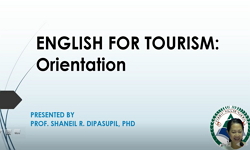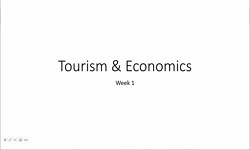As the global impact of coronavirus (COVID-19) pandemic has continued to evolve since January 2020, Southeast Asia was one of the first regions hit hard by the contagious disease due to its close geographical proximity to China and heavy dependency on...
http://chineseinput.net/에서 pinyin(병음)방식으로 중국어를 변환할 수 있습니다.
변환된 중국어를 복사하여 사용하시면 됩니다.
- 中文 을 입력하시려면 zhongwen을 입력하시고 space를누르시면됩니다.
- 北京 을 입력하시려면 beijing을 입력하시고 space를 누르시면 됩니다.
https://www.riss.kr/link?id=A107181355
- 저자
- 발행기관
- 학술지명
- 권호사항
-
발행연도
2020
-
작성언어
English
- 주제어
-
KDC
454
-
등재정보
KCI등재
-
자료형태
학술저널
- 발행기관 URL
-
수록면
1591-1601(11쪽)
-
KCI 피인용횟수
0
- DOI식별코드
- 제공처
-
0
상세조회 -
0
다운로드
부가정보
다국어 초록 (Multilingual Abstract)
As the global impact of coronavirus (COVID-19) pandemic has continued to evolve since January 2020, Southeast Asia was one of the first regions hit hard by the contagious disease due to its close geographical proximity to China and heavy dependency on tourism. In this paper, we examine the impact of COVID-19 pandemic across ASEAN-6 countries focusing on tourism industry. For empirical analysis, we use various unit root tests to check whether the time series for international inbound visitors to ASEAN-6 countries satisfy the random walk hypothesis (Shiller & Perron, 1985). If inbound visitors show a unit root (random walk, or non-stationary process), it implies that the shocks to visitor arrivals are permanent. On the other hand, if the visitor arrivals do not reveal a unit root (or stationary process), it indicates that the shocks to visitor arrivals are temporary (Bhattacharya & Narayan, 2005). We find that the effects of COVID-19 on reduction of inbound tourists are transitory for Indonesia and Thailand. While the negative effects of COVID-19 in most of tourist groups of Singapore are permanent. For Malaysia, the temporary effects are revealed on the international visitors from Indonesia, whereas the permanent effects are reported for the inbound tourists from Singapore and China.
참고문헌 (Reference)
1 손진곤, "중량별 제주 넙치 산지가격의 선도가격 추정 및 시장가격 충격에 대한 동태적 영향 분석" 한국수산해양교육학회 28 (28): 198-210, 2016
2 Stathis Polyzos, "Tourism demand and the COVID-19 pandemic: an LSTM approach" Informa UK Limited 46 (46): 175-187, 2021
3 Lee-Peng Foo, "The impact of COVID-19 on tourism industry in Malaysia" Informa UK Limited 1-5, 2020
4 Kim S, "The effects of SARS on the Korean hotel industry and measures to overcome the crisis: A case study of six Korean five-star hotels" 10 (10): 369-377, 2005
5 Au AK, "The effects of SARS on the Hong Kong tourism industry: An empirical evaluation" 10 (10): 85-95, 2005
6 Rassy D, "The economic impact of H1N1 on Mexico's tourist and pork sectors" 22 (22): 824-834, 2013
7 Kim YW, "The economic burden of the 2009 pandemic H1N1 influenza in Korea" 45 (45): 390-396, 2013
8 Francesc Romagosa, "The COVID-19 crisis: Opportunities for sustainable and proximity tourism" Informa UK Limited 22 (22): 690-694, 2020
9 Kwiatkowski D, "Testing the null hypothesis of stationarity against the alternative of a unit root: How sure are we that economic time series have a unit root?" 54 : 159-178, 1992
10 Bhattacharya M, "Testing for the random walk hypothesis in the case of visitor arrivals: Evidence from Indian tourism" 37 : 1485-1490, 2005
1 손진곤, "중량별 제주 넙치 산지가격의 선도가격 추정 및 시장가격 충격에 대한 동태적 영향 분석" 한국수산해양교육학회 28 (28): 198-210, 2016
2 Stathis Polyzos, "Tourism demand and the COVID-19 pandemic: an LSTM approach" Informa UK Limited 46 (46): 175-187, 2021
3 Lee-Peng Foo, "The impact of COVID-19 on tourism industry in Malaysia" Informa UK Limited 1-5, 2020
4 Kim S, "The effects of SARS on the Korean hotel industry and measures to overcome the crisis: A case study of six Korean five-star hotels" 10 (10): 369-377, 2005
5 Au AK, "The effects of SARS on the Hong Kong tourism industry: An empirical evaluation" 10 (10): 85-95, 2005
6 Rassy D, "The economic impact of H1N1 on Mexico's tourist and pork sectors" 22 (22): 824-834, 2013
7 Kim YW, "The economic burden of the 2009 pandemic H1N1 influenza in Korea" 45 (45): 390-396, 2013
8 Francesc Romagosa, "The COVID-19 crisis: Opportunities for sustainable and proximity tourism" Informa UK Limited 22 (22): 690-694, 2020
9 Kwiatkowski D, "Testing the null hypothesis of stationarity against the alternative of a unit root: How sure are we that economic time series have a unit root?" 54 : 159-178, 1992
10 Bhattacharya M, "Testing for the random walk hypothesis in the case of visitor arrivals: Evidence from Indian tourism" 37 : 1485-1490, 2005
11 Phillips PCB, "Testing for a unit root in times series regression" 75 (75): 335-346, 1988
12 Solarin SA, "September 11 attacks, H1N1 influenza, global financial crisis and tourist arrivals in Sarawak" 26 (26): 298-300, 2015
13 Luc Renaud, "Reconsidering global mobility – distancing from mass cruise tourism in the aftermath of COVID-19" Informa UK Limited 22 (22): 679-689, 2020
14 Stefan Gössling, "Pandemics, tourism and global change: a rapid assessment of COVID-19" Informa UK Limited 29 (29): 1-20, 2021
15 Brahmbhatt M, "On SARS type economic effects during infectious disease outbreaks" World Bank 2008
16 Dickey DA, "Likelihood ratio statistics for autoregressive time series with a unit root" 49 : 1057-1072, 1981
17 Brooks C, "Introductory econometrics for finance" 2014
18 Verikios G, "H1N1 influenza and the Australian macroeconomy" 17 (17): 22-51, 2012
19 Ramelli S, "Feverish stock price reaction to COVID-19" 2020
20 Lee GO, "Epidemics, labour markets and unemployment: The impact of SARS on human resource management in the Hong Kong service sector" 16 (16): 752-771, 2005
21 Dickey DA, "Distributions of the estimators for autoregressive time series with a unit root" 74 : 431-445, 1979
22 Inmaculada Gallego, "Changes in air passenger demand as a result of the COVID-19 crisis: using Big Data to inform tourism policy" Informa UK Limited 29 (29): 1470-1489, 2020
23 OECD, "COVID-19 crisis response in ASEAN Member States" 2020
24 Lean HH, "Asian financial crisis, avian flu and terrorist threats: Are shocks to Malaysian tourist arrivals permanent or transitory?" 14 (14): 301-321, 2009
25 이진수, "A Comparative Study on Volatility Spillovers in the Stock Markets of Korea, China and Japan" 한국수산해양교육학회 28 (28): 127-136, 2016
동일학술지(권/호) 다른 논문
-
Biofloc Technology(BFT) 적용을 위한 수질특성에 대한 연구
- 한국수산해양교육학회
- 최지용(Ji Yong CHOI)
- 2020
- KCI등재
-
서해안 해양 출수 유물 조사에 따른 고대 선박 닻돌 형태 분석 -인천 옹진군 영흥도선 인근 유물을 중심으로-
- 한국수산해양교육학회
- 이태호(Tae-Ho LEE)
- 2020
- KCI등재
-
수해양 계열 고등학생들의 학교생활 스트레스에 대한 잠재계층 분석 연구
- 한국수산해양교육학회
- 허균(Gyun HEO)
- 2020
- KCI등재
-
간호 대학생의 메타인지, 학습몰입이 문제해결능력에 미치는 영향
- 한국수산해양교육학회
- 남문희(Mum Hee NAM)
- 2020
- KCI등재
분석정보
인용정보 인용지수 설명보기
학술지 이력
| 연월일 | 이력구분 | 이력상세 | 등재구분 |
|---|---|---|---|
| 2027 | 평가예정 | 재인증평가 신청대상 (재인증) | |
| 2021-01-01 | 평가 | 등재학술지 유지 (재인증) |  |
| 2018-01-01 | 평가 | 등재학술지 유지 (등재유지) |  |
| 2015-01-01 | 평가 | 등재학술지 유지 (등재유지) |  |
| 2011-01-01 | 평가 | 등재학술지 유지 (등재유지) |  |
| 2009-08-26 | 학술지명변경 | 외국어명 : 미등록 -> JOUNAL OF FISHERIES AND MARINE SCIENCES EDUCATION |  |
| 2009-01-01 | 평가 | 등재학술지 유지 (등재유지) |  |
| 2006-06-21 | 학술지등록 | 한글명 : 수산해양교육연구외국어명 : JOURNAL OF FISHERIES AND MARINE SCIENCES EDUCATION |  |
| 2006-01-01 | 평가 | 등재학술지 선정 (등재후보2차) |  |
| 2005-01-01 | 평가 | 등재후보 1차 PASS (등재후보1차) |  |
| 2003-07-01 | 평가 | 등재후보학술지 선정 (신규평가) |  |
학술지 인용정보
| 기준연도 | WOS-KCI 통합IF(2년) | KCIF(2년) | KCIF(3년) |
|---|---|---|---|
| 2016 | 0.66 | 0.66 | 0.67 |
| KCIF(4년) | KCIF(5년) | 중심성지수(3년) | 즉시성지수 |
| 0.67 | 0.67 | 0.825 | 0.19 |





 DBpia
DBpia






